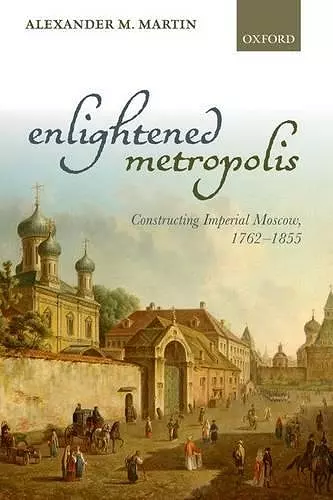Enlightened Metropolis
Constructing Imperial Moscow, 1762-1855
Format:Paperback
Publisher:Oxford University Press
Published:9th Oct '14
Currently unavailable, and unfortunately no date known when it will be back
This paperback is available in another edition too:
- Hardback£137.50(9780199605781)

Winner of the 2013 Marc Raeff Book Prize from the Eighteenth Century Russian Studies Association
Through systematic comparisons with cities in Western Europe, Alexander Martin situates Moscow in the context of the emergence of urban bourgeois civilization in the West, and helps the reader understand both how Moscow became a modern city and why this successful modernization paradoxically helped delegitimize the tsarist regime.Imperial Russia, is was said, had two capital cities because it had two identities: St. Petersburg was Russia's "window to Europe," whereas Moscow preserved the nation's proud historical traditions. Enlightened Metropolis challenges this myth by exploring how the tsarist regime actually tried to turn Moscow into a bridgehead of Europe in the heartland of Russia. Moscow in the eighteenth century was widely scorned as backward and "Asiatic." The tsars thought it a benighted place that endangered their state's internal security and their effort to make Russia European. Beginning with Catherine the Great, they sought to construct a new Moscow, with European buildings and institutions, a Westernized "middle estate", and a new cultural image as an enlightened metropolis. Drawing on the methodologies of urban, social, institutional, cultural, and intellectual history, Enlightened Metropolis asks: How was the urban environment - buildings, institutions, streets, smells - transformed in the nine decades from Catherine's accession to the death of Nicholas I? How were the lives of the inhabitants changed? Did a "middle estate" come into being? How similar was Moscow's modernization to that of Western cities, and how was it affected by the disastrous occupation by Napoleon? Lastly, how were Moscow and its people imagined by writers, artists, and social commentators in Russia and the West from the Enlightenment to the mid-nineteenth century?
Enlightened Metropolis offers an important revisionist challenge to Moscow's marginal status in the modernization of the Russian Empire. * Daniel Beer, The Times Literary Supplement *
[a] fine new history of Moscow * James Cracraft, English Historical Review *
This work will become and should remain a standard reference point for studies of Moscow and indeed Russia of this period for decades to come. * Paul Keenan, History *
Enlightened Metropolis is a prodigiously researched book ... The reader is amazed by the wealth of sources and statistics and the relentless comparison of Moscow with Russian and other European cities ... [Martin] has significantly advanced the urban, social, institutional, and cultural study of the empire during the watershed period of the late eighteenth and early nineteenth centuries. * Cynthia Hyla Whittaker, Journal of Modern History *
The book will become essential to any course on Russian cities, and would be equally well suited to courses on comparative urban history, or on Russian social history because of its nuanced and original perspective on Russian social hierarchies ... the book offers scholars rich detail on material culture, everyday life, urban personal narratives, the development of Russian urban ethnography, and memory and nostalgia. It should be required reading for anyone interested in the history of imperial Russia. * Katherine Pickering Antonova, Ab Imperio *
Alexander Martin's Enlightened Metropolis is important and admirable work, which gives to Moscow its rightful place in a Russian Enlightenment ... masterful * Albert J. Schmidt, Journal of Social History *
an enormously rich account based on extensive historical research ... contextualizing Moscow's history within the wider history of urban Europe, and providing an account illuminating the city's history from a number of competing perspectives -- including those of the rich, poor, and middling, as well as those of foreigners. Martin's is thus a well-rounded history of Moscow as an idea, a built environment, and a lived community. * Comments from the Urban History Association on the award of the 2015 prize for the best book of 2013-2014 in non-North American urban history *
- Winner of Winner of the 2013 Marc Raeff Book Prize from the Eighteenth Century Russian Studies Association; Co-winner of the 2015 prize of the Urban History Association for the best book of 2013-2014 in non-North American urban history.
ISBN: 9780198722885
Dimensions: 234mm x 156mm x 20mm
Weight: 508g
360 pages